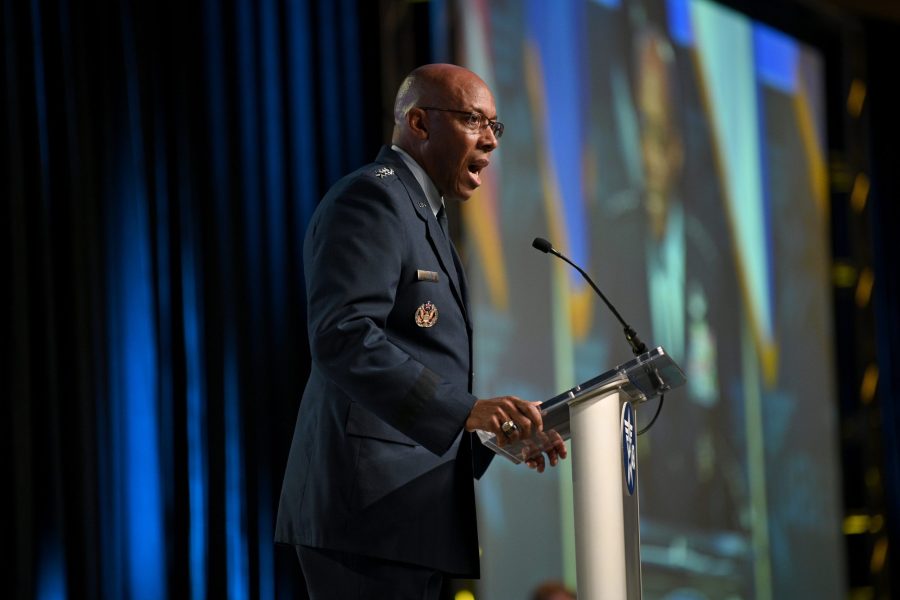With his promotion to Chairman of the Joint Chiefs of Staff likely coming soon, Air Force Chief of Staff Charles Q. Brown Jr. marked perhaps his final speech to a large Air Force audience on the job with a simple message: “If we fail to adapt, we risk losing.”
Addressing a packed room full of Airmen at AFA’s Air, Space & Cyber Conference, Brown detailed a realistic picture of the challenges the U.S. while also projecting optimism on the work that has been done and will continue after he leaves the CSAF job.
“Change is a journey and the journey must continue,” Brown said.
“Change” has been Brown’s lodestar since he was confirmed as head of the Air Force in 2020—his signature motto has been “Accelerate Change or Lose,” and President Joe Biden cited his push for modernization and adaptation as a key factor in his selection to be the next Chairman of the Joint Chiefs.
On Sept, 12, though, Brown said he wanted “to reflect on the journey of the last three years—on our accomplishments. I saw the evolving strategic environment and I knew we needed to change.”
Brown said he sought to ensure the Air Force is “placing greater focus on future conflict.”
Under Brown and Secretary of the Air Force Frank Kendall, the Air Force has been on the front foot of America’s pivot to the Pacific—even before China was outlined as the U.S. military’s “pacing challenge” in the 2022 National Defense Strategy.
One of Brown’s biggest efforts on that front has been his four “Action Orders,” organized simply as A, B, C, and D.
Airmen
Citing one example of the Air Force making practical changes to improve service members’ lives, Brown noted that his team helped change Airmen’s performance reviews.
“We had bullets that many could not understand,” he said. “We had 60,000 made-up acronyms by removing all the vowels. … If a family member or future employer read your performance report, they would have no clue what you’ve done in your career.”
The service has also tried to improve the everyday lives of Airmen by “addressing factors that contribute to their well-being and those that detract from their success,” Brown said.
Bureaucracy
The U.S. military is a massive, nearly $1 trillion enterprise that does not move quickly—hamstrung by entrenched interests and longstanding processes. But just because the Pentagon has operated as a lumbering institution for most of the 21st century does not mean it has to continue that way, Brown noted.
“I have found in bureaucratic processes, it is hard to say yes, it’s easy to say no,” Brown said. “If there is something you believe in, then you need to get past what I call the five stages of no: hell no, no, we’ll think about it, not a bad idea, we should be doing it already.”
Competition
Given China’s ability to target and strike U.S. air bases, the Air Force wants to move away from large, fixed locations and revamp how the service thinks about its future force structure, deployment models, and basing—such as implementing the island-hoping Agile Combat Employment concept. Brown said the U.S. also needs Airmen and service officials to understand their competitors better.
The Air Force is “refining, improving, creating a more agile and lethal force,” Brown said.
Design Implementation
Brown also noted the Air Force’s modernization efforts will be for naught if they are not put into practice.
“How we need to make difficult force structure decisions, how we need to develop an affordable and analytically defensible force structure, how we accelerate the transition from the force we have to the force required,” are all things the Air Force has attempted to confront under Brown’s leadership. That will continue, he predicted.
Brown’s tenure as Chief was supposed to last four years, but he held the job for less than three before President Joe Biden tapped him to become the military’s top officer. Now, he is set to become the first Airman to be Chairman in 18 years, once the Senate confirms him.
But while he will no longer be Chief, Brown said he is confident the service he led will continue to adapt.
“Change must continue,” Brown said. “We’ve changed before and we can do it again. We know airpower is the answer and that we are the most capable, most respected Air Force in the world.”
